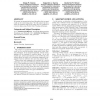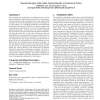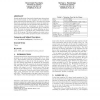ATAL
2007
Springer
14 years 3 months ago
2007
Springer
This paper addresses distributed task allocation in complex scenarios modeled using the distributed constraint optimization problem (DCOP) formalism. We propose and evaluate a nov...
ATAL
2007
Springer
14 years 3 months ago
2007
Springer
We present an argumentation-based formalism that an agent could use for constructing plans. We will analyze the interaction of arguments and actions when they are combined to cons...
ATAL
2007
Springer
14 years 3 months ago
2007
Springer
Interactions between agents in an open system such as the Internet require a significant degree of flexibility. A crucial aspect of the development of such methods is the notion o...
ATAL
2007
Springer
14 years 3 months ago
2007
Springer
This paper extends the framework of dynamic influence diagrams (DIDs) to the multi-agent setting. DIDs are computational representations of the Partially Observable Markov Decisio...
ATAL
2007
Springer
14 years 3 months ago
2007
Springer
We contribute an approach for interactive policy learning through expert demonstration that allows an agent to actively request and effectively represent demonstration examples. I...
ATAL
2007
Springer
14 years 3 months ago
2007
Springer
As more and more cars are equipped with GPS and Wi-Fi transmitters, it becomes easier to design systems that will allow cars to interact autonomously with each other, e.g., regard...
ATAL
2007
Springer
14 years 3 months ago
2007
Springer
We investigate the properties of a multiagent system where each (distributed) agent locally perceives its environment. Upon perception of an unexpected event, each agent locally c...
ATAL
2007
Springer
14 years 3 months ago
2007
Springer
Categories and Subject Descriptors Artificial Intelligence Intelligent Agents, Multiagent Systems General Terms Keywords
ATAL
2007
Springer
14 years 3 months ago
2007
Springer
Merging operators try to define the beliefs of a group of agents according to the beliefs of each member of the group. Several model-based propositional belief merging operators h...
ATAL
2007
Springer
14 years 3 months ago
2007
Springer
Formal specifications of protocol-oriented agent interactions have focused mainly on the semantics of the constituent agent communication language (ACL). We argue that a proper th...



